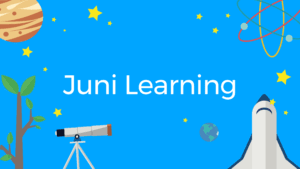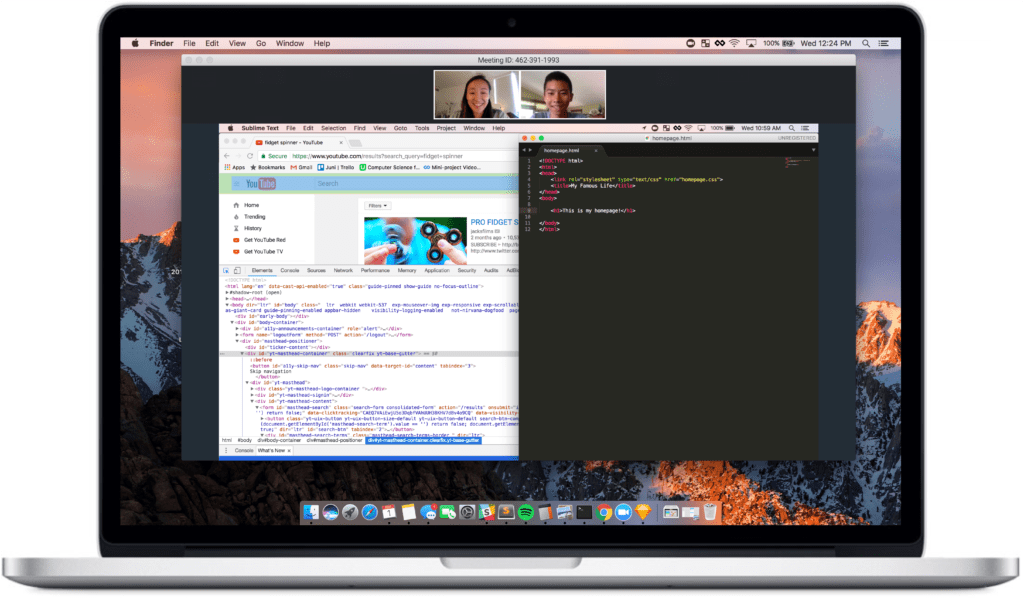Over the past few years, I have watched the number and variety of coding classes for kids (outside of school) grow quite a lot. Kids can take classes in camps during the summer, participate in after-school programs during the school year, and even attend one-day workshops hosted at libraries and universities. There are coding classes for students with no experience all the way up to classes for those who have been coding for years. Teachers know they need to make the material interesting and engaging for kids, and thus, you will find many different approaches to teach coding. Kids might learn to code with Minecraft, create games with Scratch, or learn a particular language like Python or Java.
Would you like your child to learn to code? Many parents want their kids to learn to code but for various reasons, the opportunity to take a class is not always possible. Perhaps your school does not offer coding classes or you can’t fit a class into your family’s schedule. In some cases, there might not even be a coding class available near your home. It can be very frustrating.
 Well, I have some good news for you. Your kids can now learn to code in the comfort of your home, based on your schedule. Juni Learning offers live, private online coding classes for students ages 5-18. Each student is paired with a teacher for one-on-one video instruction. Students learn how to build games, apps, and websites in a personalized learning environment. Scheduling is very flexible and sessions are available weekdays and weekends.
Well, I have some good news for you. Your kids can now learn to code in the comfort of your home, based on your schedule. Juni Learning offers live, private online coding classes for students ages 5-18. Each student is paired with a teacher for one-on-one video instruction. Students learn how to build games, apps, and websites in a personalized learning environment. Scheduling is very flexible and sessions are available weekdays and weekends.
How it Works
Students work one-on-one with their instructors at their own pace and meet their teachers one or two times a week for 50 minutes via video chat. In addition, they work on individual assignments outside of class. By the end of each course, students will have completed master projects like a Space Invaders game, a YouTube clone, Minecraft mod, or a mini Android app.

Curriculum Development and Teaching Style
I spoke with Vivian Shen, co-founder of Juni Learning, and asked her to explain how the curriculum was developed. Vivian said, “We developed the curriculum with kids in mind, and ultimately the progression of topics mirrors our university experience. We start our youngest students with the Game Master track in Scratch, because it’s a drag-and-drop language where students can focus on learning the fundamental building blocks of coding without having to worry about typing and syntax. Then, we offer a series of tracks with themes based on students’ interests. For example, kids more interested in design and art will want to take Web Superstar, where they design and code their own websites. Each track also focuses on one or two specific programming languages, so that students learn several different languages throughout their education with Juni. Overall, the topics we cover are similar to the progression of a college course, like the introductory classes we took at Stanford (CS106A and CS106B), tailored for kids.”
In terms of their approach to teaching, Vivian said, “Our pedagogy is focused on project-based classes. During each class session, the student is introduced to new topics before applying them to multiple mini-projects. The students re-apply these concepts towards Master Projects in each course, which range from fully-fledged games like Flappy Bird to newsreader web apps.”
Classes are scheduled on a recurring basis, and students are assigned a primary teacher who will guide them through the program. All teachers are from top-tier universities like Stanford, Harvard, MIT, and UC Berkeley. Parents can see their children’s progress in the Juni app and message with their teachers about any issues.
Choosing a Class
Juni has courses for all ages and experience levels. Beginner courses focus on teaching the fundamentals of computer science, like variables, loops, conditionals, and functions. Here is a sample of some of their classes:
Juni Jr – Juni created this course specifically for 6-year-olds. It introduces their youngest students to the concepts of logic, sequencing, loops, and events in a fun and engaging way. They also get to practice fundamental skills like basic algebra, reading, and public speaking. Together, they build games, solve puzzles, and design art.
Web Level 2: App Master – This course is for kids ages 14 – 18 and guides students through building and deploying websites and web applications. Both frontend (HTML, CSS, Javascript, and JQuery) and backend development (APIs and databases) are covered. The master project for this course is to develop a web application that fetches news articles from an API and displays a customized news feed to the user.
Python Level 2: Problem Solver – This course is for kids ages 12 – 18 years old and dives deeper into Python fundamentals with loops, variables, functions, conditionals, and functions, while also introducing more complex topics such as lists, dictionaries, and error checking. This course also exposes students to several real-life applications for programming, including in music, ciphers, and predictive algorithms.
AP Computer Science A – This course is geared for students ages 14 – 18 years old and guides students through learning Java, with an emphasis on object-oriented programming. Students build a variety of complex projects while learning about objects, classes, scope, and inheritance. This course also covers basic searching and sorting algorithms in Java. This course prepares students for the AP Computer Science A exam, which is administered in May of each year.
USACO Training Program – This is an invitation-only training program where students participate in the four online contests held per year. All students start in the Bronze division and can be promoted to upper divisions based on their contest scores. This program focuses on training students to work through complex problems and developing their problem-solving skills. Juni also teaches more advanced algorithms and techniques as required.
Teachers make a recommendation at the end of each track on where the student should be placed. Visit the courses page for an overview of each course and contact Juni directly if you have questions about choosing the right class for your child.
Free Trial
Before committing to a coding class, I would recommend taking a free trial class. It’s a great opportunity to get to know Juni Learning and their teachers and see how they will work with your child. This should give you a sense if virtual learning is a good fit for your child. You can schedule your free trial directly on their website.
Vivian also said that parents should email or call the company with any questions or concerns. You can reach Vivian directly at [email protected] or by phone at 650-263-4306.

About Juni Learning
The founders, Vivian Shen and Ruby Lee, met while they were students at the Stanford Computer Science department and went on to spend time at Google in software engineering and product management respectively. On a fun side note, Ruby is a native of the Boston area and a graduate of Shrewsbury High School! At Stanford, they bonded over their mutual belief that kids who want to learn subjects traditionally reserved for college like coding, entrepreneurship, and design should be empowered to do so.
Juni Learning was founded in April of 2017, when Vivian and Ruby piloted their coding classes in Scratch and Web development with 10 students in the Bay Area. Since then, they have worked with dozens of kids in California, Shanghai, Hong Kong and London to bring a Silicon Valley education around the world. Since the pilots, they have built a digital learning platform for learners and parents, and added Data Master (Python) and App Master (Web Development) to their curriculum. In the future, they are looking to continue building out their computer science curriculum up through AP Computer Science and introductory university course levels, while also expanding into other areas like design, foreign languages and more.





